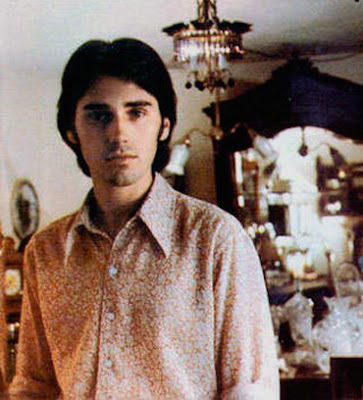Emitt Rhodes - Emitt Rhodes (SUNSHINE POP US 1970)
 "EMITT RHODES - EMITT RHODES" (SUNSHINE POP US 1970)
"EMITT RHODES - EMITT RHODES" (SUNSHINE POP US 1970)"Emitt Rhodes" born and raised in Hawthorne, California, a bastion of Power-Pop thanks to homeboys "The Beach Boys", "Emitt Rhodes" started with Rock 'n' Roll in his early teens, playing drums in a band called "The Emerals".
"Emitt Rhodes" said: "My father was really nice", he let me use the Garage. Having a garage was, for a drummer, a really popular thing.
Every band needs a place to rehearse and I had one".
"The Emerals" soon evolved into "The Palace Guard", who had a minor hit single called "Falling Sugar" / "Oh Blue" (Verve VK 10410).
"Emitt Rhodes" was still the drummer, but he was looking to step out from behind the drum kit and into the spotlight.
In 1966, he left "The Palace Guard" and formed another group called "The Merry-Go-Round".
Instead of keeping time, "Emitt Rhodes" was now the guitar-playing frontman and songwriter.
 "The Merry-Go-Round" quickly recorded what would be its biggest hit, a Beatles' "Rubber Soul" sound-alike called "Live" / "You're A Very Lovely Woman" (AM SP 4132).
"The Merry-Go-Round" quickly recorded what would be its biggest hit, a Beatles' "Rubber Soul" sound-alike called "Live" / "You're A Very Lovely Woman" (AM SP 4132). The Merry-Go-Round: "Live" / "You're A Very Lovely Woman", 1967 French Single AM 503
The Merry-Go-Round: "Live" / "You're A Very Lovely Woman", 1967 French Single AM 503Based on a demo of "Live" and another song called "Clown's No Good" "A&M Records" signed "The Merry-Go-Round" and released "Live" as a single.
After the song shot to number one in L.A., "A&M" slapped together a bunch of demos and called it "The Merry-Go-Round"'s debut album called simply "The Merry-Go-Round".
But by 1969 "Emitt Rhodes", now 19, grew tired of the inevitable in-fighting that comes with being in a group.
"Emitt Rhodes" wanted to make music for himself and by himself, so he set up a makeshift studio in a shed behind his parents house.
 'I bought myself a machine. It was an old four track machine, an Ampex, "Emitt Rhodes" recalled:'It had huge knobs and giant meters. It was the size of a washing machine'.
'I bought myself a machine. It was an old four track machine, an Ampex, "Emitt Rhodes" recalled:'It had huge knobs and giant meters. It was the size of a washing machine'."Emitt Rhodes" began bashing out songs for his first solo album.
Alone in the studio he was open to experimentation. 'I was a drummer and I had a piano and I had a guitar and I just started there.
I would buy an instrument and an instructional book, and just play scales for an hour a day until I felt comfortable doing it. And then I would write parts. I was more of an arranger I guess'.
'With only three microphones, two mixers and his four track crowded in the 20 foot long by 10 foot wide shed, recording was a time consuming process. "I had the machine on one end and the drums on the other, and I'd press the record button and run over and sit down and put the phones on. It was pretty rudimentary'.
He would have to record one instrument part at a time on the AMPEX four-track machine — laying down drums on one track, playing guitar on the next, percussion on a third — then mixing them all down to the fourth track so as to free up the first three for new parts.
("The Beatles" employed the very same technique in the recording of "Sgt. Pepper's Lonely Hearts Club Band", though they had the luxury of being four separate musicians and having "George Martin" and "Geoff Emerick" to perform the more technical tasks).
As "Emitt Rhodes" assembled the record, he had no idea he was creating his masterpiece. 'I was just doing the best I could do, writing what I thought was important at the time'.
 In the middle of working on the album, "Emitt Rhodes" approached "ABC/Dunhill" with some instrumental tracks. The label signed him and paid "Emitt Rhodes" the princely sum of $5,000.
In the middle of working on the album, "Emitt Rhodes" approached "ABC/Dunhill" with some instrumental tracks. The label signed him and paid "Emitt Rhodes" the princely sum of $5,000.Also, receiving credit on the album as mixdown engineers were "Keith Olsen" and "Curt Boettcher".
When "Emitt Rhodes" was released in 1970, it charted at #29 and the single, "Fresh as a Daisy", broke the top 60.
"Emitt Rhodes" was hailed by critics as an artist to watch, and with the singer-songwriter movement just underway, his career appear to be on the fast track.
Often called a musical dead ringer for Sir Paul McCartney, "Emitt Rhodes" is really "Paul McCartney" we all wish "Paul McCartney" would be: 'an incredible pop tunesmith without all the gooey sentimentality and overflowing cuteness'.

"Emitt Rhodes"' song "Lullabye" (from "Emitt Rhodes") was featured in the 2001 "Wes Anderson" film The Royal Tenenbaums (The Criterion Collection)
Subscribe to:
Post Comments
(
Atom
)







4 Comments :
The link is wrong (it's The Bachs again...) Great music, great blog and very informative, congratulations.
Raskolnikov
Thank you for your good words!!!
i re upload this album with new photos.
enjoy it!
see you soon friend!
Emitt Rhodes was a fantastic songwriter, singer and multi-instrumentalist and a great influence on me.
Rhodes should be a household name.
Post a Comment